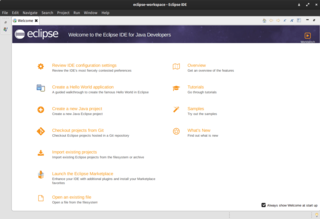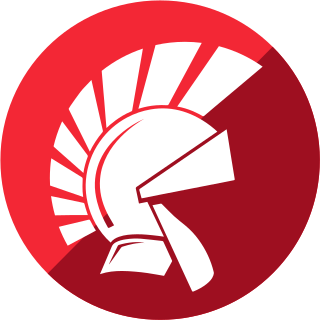
An integrated development environment (IDE) is a software application that provides comprehensive facilities to computer programmers for software development. An IDE normally consists of at least a source code editor, build automation tools and a debugger. Some IDEs, such as NetBeans and Eclipse, contain the necessary compiler, interpreter, or both; others, such as SharpDevelop and Lazarus, do not.

Eclipse is an integrated development environment (IDE) used in computer programming. It contains a base workspace and an extensible plug-in system for customizing the environment. Eclipse is written mostly in Java and its primary use is for developing Java applications, but it may also be used to develop applications in other programming languages via plug-ins, including Ada, ABAP, C, C++, C#, Clojure, COBOL, D, Erlang, Fortran, Groovy, Haskell, JavaScript, Julia, Lasso, Lua, NATURAL, Perl, PHP, Prolog, Python, R, Ruby, Rust, Scala, and Scheme. It can also be used to develop documents with LaTeX and packages for the software Mathematica. Development environments include the Eclipse Java development tools (JDT) for Java and Scala, Eclipse CDT for C/C++, and Eclipse PDT for PHP, among others.

WebObjects is a Java web application server and a server-based web application framework originally developed by NeXT Software, Inc. As of 2009 the software has been independently maintained by a volunteer community.

Delphi is a software product that uses the Delphi dialect of the Object Pascal programming language and provides an integrated development environment (IDE) for rapid application development of desktop, mobile, web, and console software, currently developed and maintained by Embarcadero Technologies.

IntelliJ IDEA is an integrated development environment (IDE) written in Java for developing computer software. It is developed by JetBrains, and is available as an Apache 2 Licensed community edition, and in a proprietary commercial edition. Both can be used for commercial development.
Maven is a build automation tool used primarily for Java projects. Maven can also be used to build and manage projects written in C#, Ruby, Scala, and other languages. The Maven project is hosted by the Apache Software Foundation, where it was formerly part of the Jakarta Project.

Komodo Edit is a free and open source text editor for dynamic programming languages. It was introduced in January 2007 to complement ActiveState's commercial Komodo IDE. As of version 4.3, Komodo Edit is built atop the Open Komodo project.
The international standard IEC 61499, addressing the topic of function blocks for industrial process measurement and control systems, was initially published in 2005. The specification of IEC 61499 defines a generic model for distributed control systems and is based on the IEC 61131 standard. The concepts of IEC 61499 are also explained by Lewis and Zoitl as well as Vyatkin.

Aptana, Inc. is a company that makes web application development tools for use with a variety of programming languages. Aptana's main products include Aptana Studio, Aptana Cloud and Aptana Jaxer.
Knowledge Discovery Metamodel (KDM) is a publicly available specification from the Object Management Group (OMG). KDM is a common intermediate representation for existing software systems and their operating environments, that defines common metadata required for deep semantic integration of Application Lifecycle Management tools. KDM was designed as the OMG's foundation for software modernization, IT portfolio management and software assurance. KDM uses OMG's Meta-Object Facility to define an XMI interchange format between tools that work with existing software as well as an abstract interface (API) for the next-generation assurance and modernization tools. KDM standardizes existing approaches to knowledge discovery in software engineering artifacts, also known as software mining.
JBoss Tools is a set of Eclipse plugins and features designed to help JBoss and JavaEE developers develop applications. It is an umbrella project for the JBoss developed plugins that will make it into JBoss Developer Studio.
JBoss Developer Studio (JBDS) is a development environment created and currently developed by JBoss and Exadel.
Java Composite Application Platform Suite is a standards-based enterprise service bus software suite from Oracle Corporation. The suite has several components that help to integrate existing applications and deliver new business services in a service-oriented architecture environment. It is a Java EE compliant platform and provides application-to-application integration, business-to-business integration, business process management along with integrated human workflow, an Enterprise Information Portal, extract transform and load (ETL), business activity monitoring and composite application development.
JACK Intelligent Agents is a framework in Java for multi-agent system development. JACK Intelligent Agents was built by Agent Oriented Software Pty. Ltd. (AOS) and is a third generation agent platform building on the experiences of the Procedural Reasoning System (PRS) and Distributed Multi-Agent Reasoning System (dMARS). JACK is one of the few multi-agent systems that uses the BDI software model and provides its own Java-based plan language and graphical planning tools.

Spring Roo is an open-source software tool that uses convention-over-configuration principles to provide rapid application development of Java-based enterprise software. The resulting applications use common Java technologies such as Spring Framework, Java Persistence API, Thymeleaf, Apache Maven and AspectJ. Spring Roo is a member of the Spring portfolio of projects.
The JAUS Tool Set (JTS) is a software engineering tool for the design of software services used in a distributed computing environment. JTS provides a Graphical User Interface (GUI) and supporting tools for the rapid design, documentation, and implementation of service interfaces that adhere to the Society of Automotive Engineers' standard AS5684A, the JAUS Service Interface Design Language (JSIDL). JTS is designed to support the modeling, analysis, implementation, and testing of the protocol for an entire distributed system.
A language workbench is a tool or set of tools that enables software development in the language-oriented programming software development paradigm. A language workbench will typically include tools to support the definition, reuse and composition of domain-specific languages together with their integrated development environment. Language workbenches were introduced and popularized by Martin Fowler in 2005.






